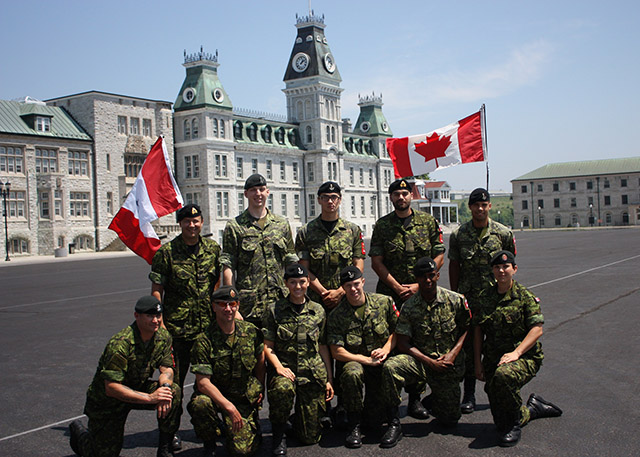
The International Four Day Nijmegen March, more commonly referred to as simply Nijmegen, is a rigorous and prestigious annual event that has taken place since 1909. It has involved Canadian participation since 1952 and requires that all military entrants complete a four-day 160km (4 x 40km) march in combat uniform carrying a minimum rucksack load of 10kg. Canada and her allies send teams every year to commemorate the liberation of the Netherlands by allied forces during World War II (WWII). Nijmegen is the largest marching event in the world, drawing over 40,000 civilian participants and 5,000 military participants annually.
The 2013 Royal Military College of Canada (RMC) Nijmegen team consists of 11 members, led by Team Leader Lt(N) Lee Pothier and 2 IC OCdt Adelaide Fearnley. The team is comprised of army and navy staff and cadets from ROTP/ RETP/ UTPNCM/ CFR/Reserve and NCM. The team includes OCdts Panza, Lessard, Pelletier, Richer and Bellamy, NCdts Duke and Hutchings, PSP Staff and reservist, Lt. Mitchell, and COR clerk Cpl. Smith. Due to academic and military training commitments, the RMC team has historically begun training much later than the other Canadian teams, (starting training in May, whereas other Canadian teams begin as early as February). All teams are required to complete 500km of marching, which must include two 40km back-to-back marches prior to departing for Nijmegen.
The RMC team completed their marches all over Kingston, ranging from the K&P (Kingston-Pembroke) trail earlier in the summer, to west end Kingston more recently for one of their 40km back-to-back marches. Throughout the course of the training period, the team was challenged not only physically, but mentally as well. At first, it seemed as though the marching would not be that difficult because of the team's relatively high fitness level. This was quickly proven wrong as the lengths of the marches grew longer and the humidity rose. Common symptoms included: unavoidable blisters, cramps, heat rashes, loss of toenails, dehydration and excessive boredom. The mental toll experienced on these marches was arguably the worst of the aforementioned afflictions, often resulting in outrageous conversations, strange new games being invented, and trance inducing music being played over a portable speaker that NCdt Duke brought on the longer marches. Other aids that helped the team along the way were the constant encouraging honks from fellow Kingstonians, singing songs from the Nijmegen song book as well as the occasional freezie and water-drops by colleagues from RMC. Many thanks must be given to the RMC Club Foundation who graciously funded new boots that all members of the team purchased, exposing many of them to the wonders that are Rockies and SWATS while saving their sore feet from blister filled misery.
An important part of our training which strengthened our resolve to complete these marches was the annual Send-off Parade held by the Canadian Nijmegen Contingent at the Ottawa War Museum, which took place on July 3rd. This event was attended by many dignitaries including our CDS, General Lawson, members of the Canadian legion, and foreign diplomats representing the host country of the Netherlands, all of whom gave their full support and blessings to the teams present. The send-off parade allowed the RMC team, who are all "first time marching rookies" to Nijmegen, to socialize and pick the brains of veteran Nijmegen marchers, including a Lt. Col. who has participated 22 times. Upon hearing the Dutch representative address the parade, the RMC team truly understood the importance of this event and just how appreciative the Dutch citizens still are for the Canadian aid in their liberation during WWII.
The team has currently marched 590km in their training and will have completed 610km upon departing for the city of Nijmegen on July 11th. The Nijmegen experience will not only build all RMC team members' leadership and fitness levels throughout the summer and final event, but it will also offer an opportunity that few in the Canadian Forces ever get the chance at. During their trip, the Canadian Nijmegen contingent visits Vimy Ridge, as well as the Canadian military cemetery at Groesbeek that serves as the final resting place for over 2,300 Canadian soldiers and airmen. The RMC Nijmegen team is excited and grateful to have been given this opportunity to represent not only the Canadian Forces, but also the Royal Military College of Canada on such a well-known international stage.
The team is very excited to depart for the Netherlands and will send an update upon returning from this remarkable journey.